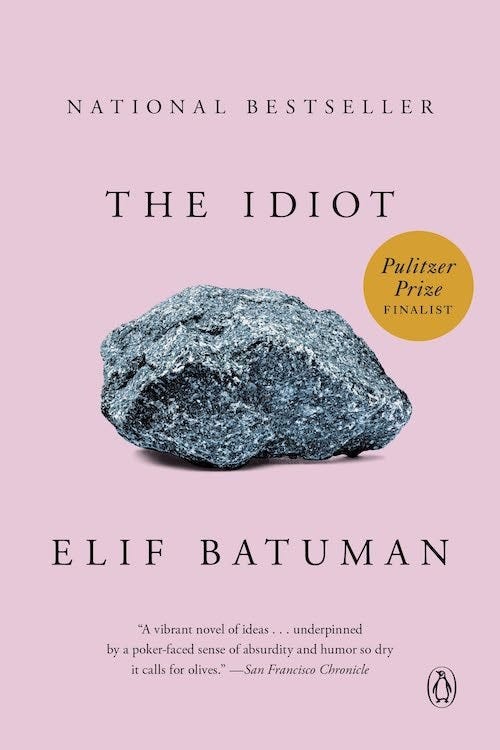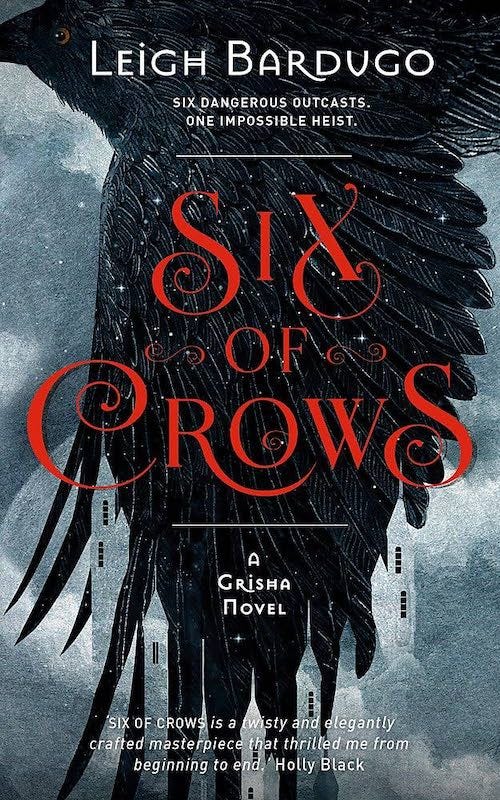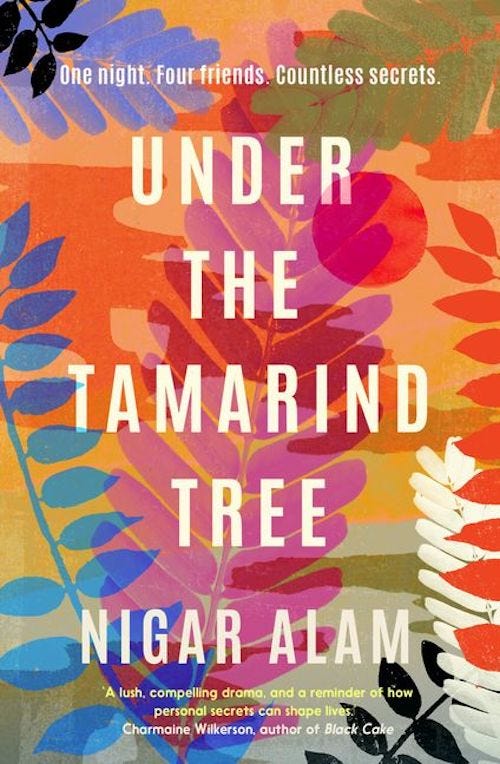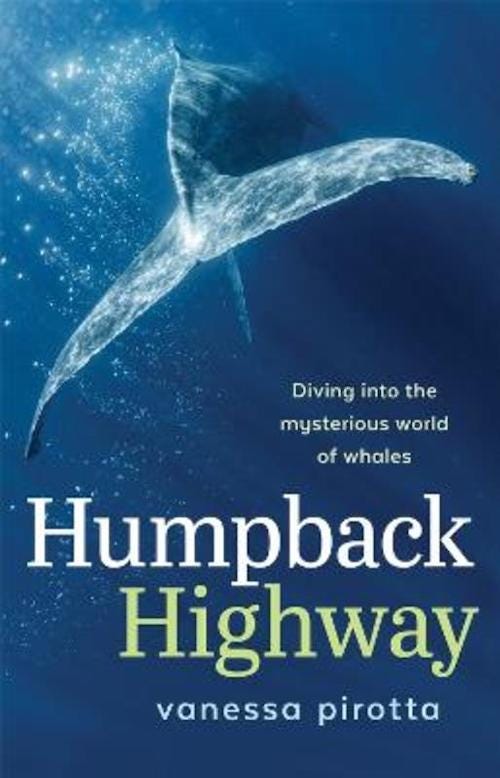It’s March 5th on the day I’m writing this, and I admit that it’s a little late to review books I read weeks ago. However, I am in a writing schlump that I must defeat, so here I am, trying my best.
February was a surprisingly productive month for me reading-wise — I read five books and started a sixth before the month was over. I have been obnoxiously proud of this and bragging to my husband non-stop but as I struggled to finish that last one, I realised I was bingeing books in order to avoid having to write about them.
It’s not that I don’t enjoy reviewing books — it’s one of my favourite things to do — but lately the imposter syndrome is hitting hard. Do I have anything interesting to say about this, that hasn’t already been said? What am I adding to the discourse that is new and thought-provoking?
In recent years, I appear to have developed obsessive thoughts about what the point is of my words. I feel like there must be a revelation in everything I say or I’m wasting people’s time and they will be disappointed in me. It’s made writing debilitating because nothing ever feels good enough, and it’s also resulting in constantly writing for external validation, rather than for myself.
Well, it’s the fourth day of our blessed Ramadan, and I feel emboldened to actually challenge my intrusive thoughts and overcome my hurdles of anxiety. So, here we are, with reviews that may not be perfect, but they exist — and for me right now, that is enough!
The Idiot by Elif Batuman
⭐️⭐️⭐️⭐️
Oh, Selin, you silly, silly girl.
The Idiot follows 18-year-old Selin, the daughter of Turkish immigrants who arrives for her first year at Harvard and struggles to find meaning in life. She is endlessly confused about the social expectations of campus life, clueless about the subtle art of flirting, and it’s 1995 so sadly she does not know what a situationship is. I would die for her.
This novel is a campus novel, full of weird and wonderful characters who flit in and out of its fragmented style. I don’t think the style is for everyone, given it’s not particularly plot-driven and is mostly just moments from Selin’s life and introspections. Like a diary, really, given how much of an unreliable narrator Selin is. My book club did NOT vibe with this pick and I didn’t think I’d like it either — I personally can’t stand the whole listless/depressed woman genre — but I ended up adoring this story, simply because I adore Selin. She has become one of my favourite characters.
I read Ivan’s messages over and over, thinking about what they meant. I felt ashamed, but why? Why was it more honorable to reread and interpret a novel like Lost Illusions than to reread and interpret some email from Ivan? … Was it because Balzac’s novels had been read and analysed by hundreds of professors, so that reading and interpreting Balzac was like participating in a conversation with all these professors, and was therefore a higher and more meaningful activity than reading an email only I could see? But the fact that the email had been written specifically for me, in response to things I had said, made it literally a conversation, in the way that Balzac’s novels — written for a general audience, ultimately in order to turn a profit for the printing industry — were not; and so wasn’t what I was doing in a way more authentic, and more human?
— Elif Batuman, The Idiot.
The Idiot is a beautifully written not-quite-coming-of-age, with a great sense of humour that is dry, witty and at times quite brutal. The best part about it, though, is how earnest it is — Selin constantly feels like an alien, like she is from another planet and doesn’t know the rules and conventions of this one. She can’t read the people around her, and is in a constant state of anxiety about their intentions and feelings (I read her as autistic or OCD-coded). It’s with this in mind that while Selin’s anxieties and spirals seem strange or irrational, the book remains endlessly empathetic and compassionate towards her. It’s all so wonderfully earnest.
The Idiot was a great read for many reasons, but a highlight for me was its exploration of complicated (read: antagonistic and yet co-dependant, cruel and yet loving) female friendships — as you can see in the quote below.
Already we were comparing to see whose way of doing things was better. But it wasn’t a competition so much as an experiment, because neither of us was capable of acting differently, and each viewed the other with an admiration that was inseparable from pity.
Things took a nose-dive, however, when I reached the last third of this book, which seems to drag on forever while adding little to the novel. I wish this section (pretty much Selin’s whole trip to Hungary) was shorter, or at the very least worth trekking through.
And oh dear, that ending, it ripped my heart right out of my chest. I had to reread the page twice. It was unexpected for me, but that was my own fault.
Six of Crows by Leigh Bardugo
⭐️⭐️⭐️⭐️⭐️
I re-read Six of Crows at least once a year since it became my all-time favourite YA fantasy novel a few years back, and it was perfect, as usual — though I still think this should have been an adult-fiction book, written exactly the same but with the characters aged in their mid-twenties.
If you haven’t read Six of Crows (and honestly, I would be surprised to hear this!), it follows a rag-tag group of talented gang members as they plan and execute a near-impossible heist into the powerfully defended Ice Court, to steal a very valuable prisoner and make a lot of money — all the while learning that true wealth is the found family you make along the way!
This super fun, surprisingly brutal heist novel also happens to have the best romance subplot of all time, complete with endless pining, longing glances, the barest of touches, and a particularly unhinged “who did this to you?!” scene. Kaz and Inej have my whole heart and are the main reason I keep coming back to this book. I continue to watch TikTok edits of them at the ripe old age of 26.
Crooked Kingdom by Leigh Bardugo
⭐️⭐️⭐️⭐️
The second half of the Six of Crows duology, Crooked Kingdom is pretty much a heist novel on crack. There are actually so many mini-heists before the main heist that it’s like if you watched all Ocean’s 11 movies at once, but more satisfying and coherent.
It’s a near-perfect sequel, with a wonderful and mature ending — but it loses one star because the chaos of this novel sometimes means there’s a little too much going on. Still a great novel and all-time-fave though!
Under The Tamarind Tree by Nigar Alam
⭐️⭐️⭐️.5
I thought I would adore Under the Tamarind tree. It had everything going for it — set in Karachi (where my family is from!), a character that haunts the narrative from the past, and dual timelines exploring a mysterious death. It was actually my pick for my book club’s March edition because, to me, the premise sounded a lot like The Djinn Waits A Hundred Years by Shubnum Khan. I went in with expectations of something similarly incredible and was subsequently a little disappointed. But perhaps that’s my fault!
The story follows Rozeena, a retired doctor aged in her 80s, who is shocked when her former friend Haaris — who she has lost contact with for mysterious reasons — reaches out and asks if his granddaughter Zara can stay with her during the summer. Rozeena reluctantly says yes, but Zara begins asking questions that threaten the life Rozeena has built, and the lies she has told to do so. As old tales begin to to crumble and the truth threatens to spill out, Rozeena must reckon with what she did all those years ago.
The setting of Under the Tamarind Tree is lush and atmospheric, with vibrant and immersive descriptions of Pakistan pre- and post-Partition. Its explorations on the power of “log kya kahenge?” and the duty we have to our family’s reputation is almost painful in the realistic ways it can make or break you, and the plot is propulsive enough without taking away from Rozeena’s own introspections.
Rozeena swallowed deeply and nodded, trying to make sense of how being seen with Zohair in the garden was being equated to [spoiler’s] death, and how both had resulted in the same lesson — do what is expected of you. Otherwise, what will people say?
— Nigar Alam, Under The Tamarind Tree.
However, where Under The Tamarind Tree falls short is in its resolutions. The stakes are high throughout much of the book, and Rozeena must reckon with lies she has told for the sake of her own security as something that she should overcome — but I’m not sure she ever really gets there, or actually grows much. Her development felt flat, unfinished, and some complications never felt fully resolved. Ultimately, I was left unsatisfied.
I also felt that the character interactions and dialogue were oddly stilted or unrealistic. It’s perhaps a nit-picky issue, but it’s still one that took me out of the story.
Still, I’m grateful this story exists — we need more novels written about the generational trauma caused by Partition, and the way Pakistani society has grown and changed in the years since. Having this glimpse into history made this novel worth it, and it’s why I still recommend others read it even if I found it to be a little lacking towards the end.
Humpback Highway by Dr Vanessa Pirotta
⭐️⭐️⭐️
I came across this book when I was asked to interview the author for Missing Perspectives’ podcast Book Smart. I instantly said yes, of course — not only do I adore whales, but I especially love biology and anything related to wildlife, as that’s the path I wanted to go down before I became a writer (I actually did work experience at Taronga Zoo!)
I read Humpback Highway in about four hours (it’s a pretty short read), and while I enjoyed the science and ocean adventure elements — Pirotta’s enthusiasm for marine biology is infectious — I was surprised that some of the most intriguing elements of her story were the least explored (like when she says motherhood radically shifted her perspective as a whale scientist — um, tell me more!). The good news is that I was able to simply ask Pirotta myself about the parts of her story that I wanted to hear more about, like the above and also her experience as a woman in STEM — she alludes to sexism in the workplace in the book but doesn’t elaborate much. Of course, this is not something everyone can do, nor should you have to in order to get the most out of this book.
The writing in Humpback Highway is quite repetitive at times, as if the author was being pushed to meet a word count. The structure is also odd and a little messy, though I think this is more the editor’s fault than Pirotta’s.
Ultimately I think the problem is that the contents of this book could have been a meaty feature article, but instead were stretched into a rather anaemic book.
Is it worth the read? Yes. Pirotta has all kinds of expertise to share about whales, and some pretty harrowing information on how climate change and ocean pollution threaten their existence. She is also just really cool, though I feel she would shine much brighter on television or with her own David Attenborough-style docuseries rather than a book!








I always imagine the characters in Six of Crows to be in their mid 20s! Such a good book.